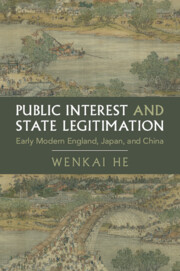Book contents
- Public Interest and State Legitimation
- Cambridge Studies in Historical Sociology
- Public Interest and State Legitimation
- Copyright page
- Dedication
- Contents
- Acknowledgments
- Introduction
- Part I Sources of Early Modern State Resilience
- Part II The Emergence of Modern Politics
- Prologue
- 5 A Political “Great Divergence”
- Conclusion
- Bibliography
- Index
5 - A Political “Great Divergence”
England (1640–1780), Japan (1853–1895), and China (1840–1911)
from Part II - The Emergence of Modern Politics
Published online by Cambridge University Press: 17 November 2023
- Public Interest and State Legitimation
- Cambridge Studies in Historical Sociology
- Public Interest and State Legitimation
- Copyright page
- Dedication
- Contents
- Acknowledgments
- Introduction
- Part I Sources of Early Modern State Resilience
- Part II The Emergence of Modern Politics
- Prologue
- 5 A Political “Great Divergence”
- Conclusion
- Bibliography
- Index
Summary
The public interest-based discourse of state legitimation continued to serve as a common normative platform for state–society interactions when each state's capacity was greatly enhanced under new socioeconomic circumstances in England (1640–1780), Japan (1853–1895), and China (1840–1911). The state–society interactions over domestic public goods provision were politically similar to those in the earlier episodes, though the scale and organizational capacity of social actors became much greater. Petitions to the state to redress specific welfare grievances did not escalate into demands for political reforms. In contrast, issues of nonmaterial public good, such as "true Christianity" in England and "national honor" in Japan, as well as the ensuing tension between the international and domestic dimensions of public interest, mobilized large-scale cross-regional and cross-sectoral petitions of public grievance. These petitions demanded fundamental political reforms in England and Japan. In China before 1895, the lack of conflict between diverse dimensions of the public interest accounts for the absence of such petitions of public grievance. When that changed, China likewise saw petitions for political change prior to the collapse of the Qing in 1911.
Keywords
- Type
- Chapter
- Information
- Public Interest and State LegitimationEarly Modern England, Japan, and China, pp. 193 - 242Publisher: Cambridge University PressPrint publication year: 2023

